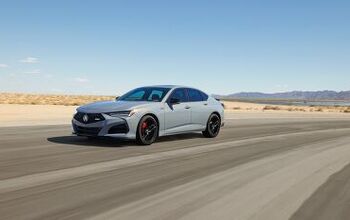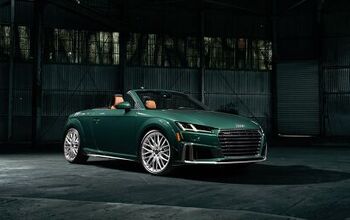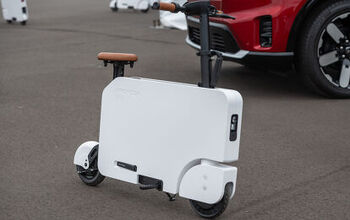California Urges Manufacturers to Tattle on Themselves

On Wednesday, the California Air Resources Board (CARB) urged manufacturers to disclose any unapproved hardware or software that might place a vehicle’s emissions outside of the acceptable parameters of legality. CARB said those who comply would be subjected to reduced penalties and reminded everyone that it’s going to be opening a state-of-the-art testing facility that will be better at catching cheaters in 2021. It’s so advanced, the board suggested it might even be able to catch totally new violations.
You’ve likely seen this tactic employed by an exasperated parent or substitute teacher. An illicit substance is found tucked away somewhere and they parade it around demanding whoever owns it to fess up immediately or face harsher consequences later. This obvious trap is best avoided by committing a lesser crime right then and there or being so obstinate that you’re issued a minor punishment just for being annoying — thus freeing you of suspicion for the pornography Mr. Lawson found taped beneath the bleachers.
The California Air Resources Board even bragged about how much money it had procured from “vehicle and engine manufacturers who did not voluntarily disclose violations” in the past by noting the staggering size of some settlements in Wednesday’s letter. It likewise warned industry players that its latest threats were not empty. Annoyed that so many companies had not proactively outed themselves five years earlier, the board announced its new screening tests have been incredibly helpful in deciding which companies require “further investigation” in the string of cases it has planned.
The message couldn’t be clearer — companies need to confess their environmental sins to California now or be thrown on the pyre for software-related witchery.
From CARB:
The results of this expanded program are now visible for all to see: multiple settlements with manufacturers for cheating on their certification documentation. Those settlements revealed a sad litany of disbenefits to public health as a result of excess emissions, and a commensurate amount of money — now exceeding one billion dollars, with more investigations underway — for mitigation and penalties with numerous manufacturers. Full compliance with CARB’s emission regulations for vehicles and other mobile sources is essential to California’s plans to meet air quality targets and to protect heavily impacted communities from the harmful effects of air pollution exposure.
This situation will not continue — It is a clear violation of public health to pollute the air with illegal devices, and it undermines the essential trust that has supported the certification program for decades. CARB is therefore now writing to you again to encourage voluntary disclosure of any potential violations with respect to these and other applicable regulatory requirements. Voluntary disclosure will trigger a reduction in penalties; failure to do so may affect the result of future enforcement actions involving your company when CARB’s new techniques — and its new state-of-the-art testing laboratory opening in 2021 — inevitably detect any violations you may have.
Ironically, defeat devices only exist to falsify testing data when manufacturers don’t feel they can adhere to the emissions standards set by regulators — and it’s looking like the bar has been set too high for diesel motors. Following the government crackdowns, automakers have moved away from diesel passenger vehicles quite aggressively — with several having eliminated them from their lineups entirely (e.g. BMW, Mercedes-Benz, and Volkswagen).
[Image: LanaElcova/Shutterstock]

A staunch consumer advocate tracking industry trends and regulation. Before joining TTAC, Matt spent a decade working for marketing and research firms based in NYC. Clients included several of the world’s largest automakers, global tire brands, and aftermarket part suppliers. Dissatisfied with the corporate world and resentful of having to wear suits everyday, he pivoted to writing about cars. Since then, that man has become an ardent supporter of the right-to-repair movement, been interviewed on the auto industry by national radio broadcasts, driven more rental cars than anyone ever should, participated in amateur rallying events, and received the requisite minimum training as sanctioned by the SCCA. Handy with a wrench, Matt grew up surrounded by Detroit auto workers and managed to get a pizza delivery job before he was legally eligible. He later found himself driving box trucks through Manhattan, guaranteeing future sympathy for actual truckers. He continues to conduct research pertaining to the automotive sector as an independent contractor and has since moved back to his native Michigan, closer to where the cars are born. A contrarian, Matt claims to prefer understeer — stating that front and all-wheel drive vehicles cater best to his driving style.
More by Matt Posky
Latest Car Reviews
Read moreLatest Product Reviews
Read moreRecent Comments
- Lou_BC Actuality a very reasonable question.
- Lou_BC Peak rocket esthetic in those taillights (last photo)
- Lou_BC A pickup for most people would be a safe used car bet. Hard use/ abuse is relatively easy to spot and most people do not come close to using their full capabilities.
- Lorenzo People don't want EVs, they want inexpensive vehicles. EVs are not that. To paraphrase the philosopher Yogi Berra: If people don't wanna buy 'em, how you gonna stop 'em?
- Ras815 Ok, you weren't kidding. That rear pillar window trick is freakin' awesome. Even in 2024.


































Comments
Join the conversation
This state's government sickens me nearly all of the time because they've replaced sound public policy with virtue signaling. THAT BEING SAID, CARB is correct. Los Angeles air quality was nasty when I moved here. It is considerably better today, although still not great. The valley areas retain heat and pollution and because the area is significantly overpopulated, the air quality suffers. Without a control group, you can guess as to whether Los Angeles would have been better without CARB doing their best Mussolini impression, but that means you trust that companies like GM and VW wouldn't lie, kill people and cheat their shareholders. There are no 'good guys' in this fight. Just don't forget it's not just government that overreaches and grabs power and lies. Would you like to talk about Facebook/Google/Twitter?
Commiefornia strikes again. What a deplorable sh!t hole